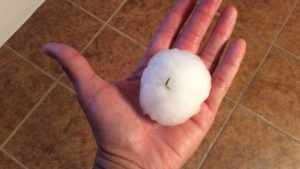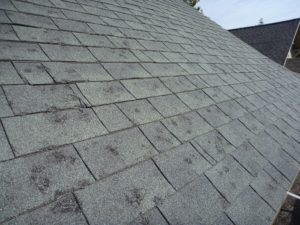How to File a Roof Hail Damage Insurance Claim
Hair Storm Project Series – Table of Contents
The articles in this hail damage roof replacement series are:
- How to File a Roof Hail Damage Insurance Claim (this article)
- How to Hire a Roofing Contractor for Hail Damage Repairs
- Step-by-Step Re-Roofing Process:
- Part 1: Roofing Materials & Tear Off
- Part 2: Chimney Leak Proofing and Roof Flashing
- Part 3: Attic Ridge Vents and Box Vents
- Part 4: Reworking the Gas Flue Vents: Base Flashing, Vent Cap and Storm Collar
- Part 5: Reworking the Plumbing Vents and Vent Boots
- Part 6: Drip Edge Roof Flashing Installation
- Part 7: Rotted Roof Deck Repair
- Part 8: Dead Valley and Stucco Wall Flashing
- Part 9: Porch Roof and Stucco Counter Flashing
- Part 10: Dormer Roof Flashing
- Part 11: Roof-to-Wall Apron / Headwall Flashing
- Part 12: Rake Wall Corner Flashing
- Replace the Gutters and install MasterShield Gutter Guards
This project series will help you negotiate the best roofing contract and show you what to expect during the roof tear-off and installation process.
Hail Storm Roof Shingle Damage
My asphalt shingle roof sustained hail damage during a severe thunderstorm. The damage was not an emergency causing roof leak right now, rather it was functional damage affecting the life of the shingles that if not repaired could cause a leak over time. It was late afternoon when a thunderstorm rolled in from the west. I thought nothing of it until I heard what sounded like gravel pelting the windows – it was hailing large stones over 1 inch in diameter.
I went out to the covered front porch and took video of the storm with my iPhone. The storm quickly intensified with high winds, pouring rain and large hail. The hail stripped leaves from the trees, filling the air. My guess is the winds were 50 mph or 60+ mph and I was worried a tornado might be approaching.
After the storm, I measured hail stones up to 1-1/2 inches in diameter of various shapes and sizes:
The west side of the house facing the storm was covered with hail-shredded leaves blown by the strong winds:
What to do After a Hail Storm
Note the date and time of the storm. Your insurance claims manager will ask for the date & time of the loss and the storm event can be correlated with reports from the local weather and public safety authorities.
After the storm I grabbed my digital camera, walked around the property and took photos of the:
- Hail stones covering the yard, sidewalk and patios.
- Hail stones set next to a tape measure.
The size of a hail stone is directly proportional to the potential for damage to the roof and shingles. - Roof – looking for obvious signs of roof damage such as missing or torn shingles,
- Outdoor air conditioning units.
Hail stones can dent and bend the cooling fins, blocking the air flow.
I also looked around inside the attic for any signs of a leak.
Hail Damage Roof Inspection
The following advice assumes your roof isn’t leaking necessitating emergency repairs, but you are concerned about functional hail damage to the shingles that could cause a leak over time if not repaired.
- The homeowner owes a 20% cancellation fee based on the roof replacement cost value if the contract is not cancelled within 3 days.
- The contingency contract is valid and binding so long as the insurance company pays the homeowner for the loss.
- All insurance payments shall be made directly to the roofing company.
- The homeowner acknowledges they lack the time and expertise to discuss matters with the insurance company and appoints the roofing company as their agent.
If you sign such an inspection report you’ve lost the opportunity to solicit competitive proposals. By authorizing the insurance company to pay the roofer directly, a dishonest roofer may take the insurance check and disappear.
Before contacting your insurance agent, you should have a reputable roofing contractor inspect your roof for potential hail damage as quickly as possible. The roofing contractor will walk your roof to assess if it has sustained hail damage to reasonably justify an insurance claim.
The roof inspection is free because it’s cost of doing business for the roofing company to be in a position to quote the job if your insurance claim is approved. Be careful in how you choose a roofing contractor to avoid fraud and unauthorized work! I recommend the following selection criteria:
- Deal only with a factory-certified roofing contractor in your area.
GAF and CertainTeed are the two largest shingle and roofing material manufacturers in the USA.
Find a GAF Master Elite™ or a CertainTeed Premier roofing contractor. - Check the Better Business Bureau report for your prospective factory-certified roofing contractor.
Avoid roofing contractors with less than an ‘A-‘ rating. A company can be rated an ‘A-‘ minus simply because of the limited length of time in operation.
Roof inspection advice:
- Make an appointment for a roof inspection.
- Be at home to meet the roofing contractor.
Explain when and what happened during the hail storm, show the roofer your videos and/or photos if available. Request that the roofer outline the hail damaged areas in chalk and take photos to review with you. - Be absolutely clear that no repairs are to be made at this time, this is only an inspection!
- Do not be pressured into signing anything!
- Go outside and watch while the roofer inspects your roof.
You should listen and watch for any signs of hammering or scraping, which could be a fraudulent attempt to mimic hail damage. Using only factory-certified contractors will go a long way to weeding out the unscrupulous roofers.
If the roof inspection found evidence of hail damage, the roofing contractor will be able to give you his or her opinion if filing an insurance claim is warranted and what he believes is the likelihood of a claim being approved.
See the International Association of Certified Home Inspectors (InterNACHI) for an excellent series hail damage (starting at item #28).
How to File a Roof Hail Damage Insurance Claim
To file an insurance claim for roof hail damage:
- Locate your homeowner’s insurance policy.
Make a note of your insurance policy number and deductible. The deductible figure will be important as explained later. - Organize your facts and records; insurance policy number, date/time of loss, hail size (if known), photos, videos, damage items.
- Call your homeowner’s insurance claim number and provide the necessary information as requested.
- You will be given a claim number by your insurer.
When an insurance claims examiner is assigned to your case, it helps to send your photos and videos of the hail storm for authenticity to better support your claim. The claim examiner will assign an claims adjuster to make an official roof inspection and prepare a repair estimate.
Claims Adjuster Roof Inspection
- The claims adjuster will contact you to make an appointment to inspect the roof.
Offer to share your photos and/or videos of the storm with the adjuster. I e-mailed my hail storm photos and video to the adjuster, who thanked me for the assistance. - You should arrange for the roofing contractor who previously inspected your roof to meet with the insurance adjuster to go on the roof and discuss his findings.
- The claim adjuster may bring along a “high team” to inspect steep and/or high roofs with proper safety gear.
- The roof inspection includes the taking of numerous photos, looking at dents in the soft metals (gutters, box vents, powered attic ventilators) and the marking off 10 ft by 10 ft “test squares” to count the number of hail stone hits on the shingles. Hail stone hits will be marked with chalk for identification in photos.
The claims adjuster will write a report on his findings, prepare an estimate to make spot repairs or replace the roof (assuming damage was found), then forward the report to your claim examiner. The claim examiner will review the report and make a decision on your claim.
Don’t be surprised if your neighbor’s roof hail damage claim is approved while yours is not. Whether or not an insurance claim is ultimately approved is highly variable depending on the severity of the damage, your roof’s construction, orientation of your house to the storm, quality of roofing materials and your particular insurance company’s evaluation criteria.
My hail damage insurance claim was approved by the claim examiner for a full roof replacement. Now I faced the challenge of choosing a roofing contractor and negotiating a roof replacement contract.






